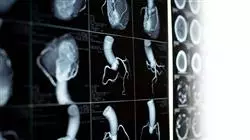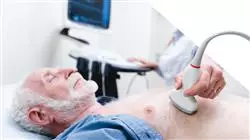University certificate
The world's largest faculty of medicine”
Description
This program delves into reperfusion therapies in patients with STE-ACS so that you can, whenever and wherever you want, continue to update and expand your knowledge”

Cases of infarction and the complications derived from this Acute Coronary Syndrome (ACS) are quite frequent in all countries of the world. Thanks to the continuous research developed in the last decades, techniques have been determined that allow the specialists to limit the size of this heart disease, thus avoiding a worsening of the patient's health and even death. The most common reperfusion therapies with the best results are systemic fibrinolysis and primary angioplasty, so knowing the latest developments related to their technical requirements, protocols, advantages and disadvantages of each has become an essential task for physicians.
In order to facilitate this update of concepts,TECH and its group of experts in Cardiology, has designed this postgraduate certificate in Reperfusion Therapies in Acute Coronary Syndrome, which not only delves into the mechanisms of restoration of blood supply, but also includes a tour of antithrombotic treatments during angioplasty and also the problem of antiplatelet therapy in the post-hospital phase in patients who also need anticoagulant therapy. It also delves into the methods of hemodynamic support that can be useful during angioplasty and the value of developing regional reperfusion networks for the treatment of infarction.
This program includes not only the best and most up-to-date content, but hours and hours of supplementary material in format, video and images, interactive abstracts, real clinical cases, recent research articles and much more. All in a convenient online format accessible from any electronic device with an internet connection and available from the beginning of the training.
Learn about the latest developments in fibrinolysis and primary angioplasty, their advantages, disadvantages and protocols, and apply the most innovative techniques to your patients”
This postgraduate certificate in Reperfusion Therapies in Acute Coronary Syndrome contains the most complete and up-to-date scientific program on the market. Its most outstanding features are:
- The development of practical cases presented by experts in Cardiology
- The graphic, schematic, and practical contents with which they are created, provide scientific and practical information on the disciplines that are essential for professional practice
- Practical exercises where self-assessment can be used to improve learningpostgraduate certificate
- Its special emphasis on innovative methodologies
- Theoretical lessons, questions to the expert, debate forums on controversial topics, and individual reflection assignments
- Content that is accessible from any fixed or portable electronic device with an Internet connection
This Postgraduate Certificate includes a section dedicated to the Infarction Code and Regional Reperfusion Networks, allowing you to be up to date with the most modern and effective protocols”
The program’s teaching staff includes professionals from sector who contribute their work experience to this educational program, as well as renowned specialists from leading societies and prestigious universities.
Its multimedia content, developed with the latest educational technology, will provide the professional with situated and contextual learning, i.e., a simulated environment that will provide an immersive education programmed to learn in real situations.
The design of this program focuses on Problem-Based Learning, by means of which the professionals must try to solve the different professional practice situations that are presented throughout the program. For this purpose, the student will be assisted by an innovative interactive video system created by renowned experts.
It delves into the latest developments in stents and the expected results of their application"

The correct treatment of infarction based on the latest techniques and protocols is a necessity. TECH provides you with all the knowledge you need to get up to date"
Objectives
The main objective of this postgraduate certificate is to provide the graduates, in just 6 weeks, the information that will allow them to know all the latest developments in the field of Reperfusion Therapies in Acute Coronary Syndrome.TECH is aware that combining your work and academic life is a complicated task, so the purpose of this type of program is to provide the most modern and necessary tools that allow you to make the most of your time, avoiding having to spend extra hours studying long, obsolete and outdated syllabi.

Your objective and TECH is the same: to get the most out of a content that will place you among the best specialists in Reperfusion Therapies in Acute Coronary Syndrome”
General Objectives
- Delve into Acute Coronary Syndrome (ACS) starting with its pathophysiology and its importance as one of the main causes of death in civilized countries
Professionalize skills in the assessment and differential diagnosis of chest pain in the emergency department understanding the value of the different complementary techniques available - Adequately classify the patient's initial risk and the most appropriate prehospital treatment and monitor measures in the prehospital phase
- Internalize reperfusion therapies, their limitations, advantages and protocols, understand the great importance of ischemia time
- Diagnose and manage the mechanical and arrhythmic complications that can occur in this syndrome
- Implement appropriate treatment measures during the hospital phase and the value of Coronary Units
- Develop the value and structure of Cardiac Rehabilitation programs
- Understand the treatments that have provided value in secondary prevention of these patients
Specific Objectives
- Recognize the time course of myocardial ischemic necrosis and understand the problem of ischemia time
- Assess the available strategies for reperfusion, fibrinolysis and primary angioplasty, their advantages and disadvantages
- Control the necessary material and protocols to perform fibrinolysis or primary angioplasty
- Know in detail the anticoagulant and antiplatelet therapy in the catheterization laboratory
- Describe a protocol for antiplatelet treatment in patients who also need to take anticoagulant drugs
- Internalize hemodynamic support measures during primary angioplasty
- Control the usefulness of regional reperfusion networks in the treatment of infarction

The best university program to update your knowledge in long-term antiplatelet treatment”
Postgraduate Certificate in Reperfusion Therapies in Acute Coronary Syndrome
Reperfusion therapies are a set of treatments for patients presenting with acute coronary syndrome, including thrombolysis and angioplasty, both aimed at restoring blood flow to the heart.
Acute coronary syndrome occurs when plaque that builds up in the coronary arteries ruptures, which can cause blood clots to form. These clots can block blood flow to the heart, which can lead to a heart attack.
Thrombolysis is a therapy used to dissolve blood clots blocking the coronary arteries. This is done by infusing a drug called a ""thrombolytic"" through a vein in the arm. The thrombolytic causes the clot to dissolve to restore blood flow.
Angioplasty, on the other hand, is an invasive procedure that involves inserting a thin tube (catheter) into the blocked coronary artery. At the end of the catheter, there is a balloon that is inflated to open the artery. A stent (tube-like device) may also be inserted to keep the artery open and prevent it from becoming blocked again.
Reperfusion therapies are a combination of treatments aimed at restoring blood flow to the heart in patients with acute coronary syndrome. They are used in cases where the coronary artery is completely blocked or severely blocked and can help prevent or reduce damage to the heart. It is important that these therapies are performed by a trained medical team and in a specialized cardiology center.
Reperfusion therapies in ACS seek to restore coronary blood circulation and, thus, decrease cardiac damage. This specialized course aims to enable students to develop skills in emergency decision making, management of complications and selection and evaluation of the most appropriate reperfusion techniques for each patient.







